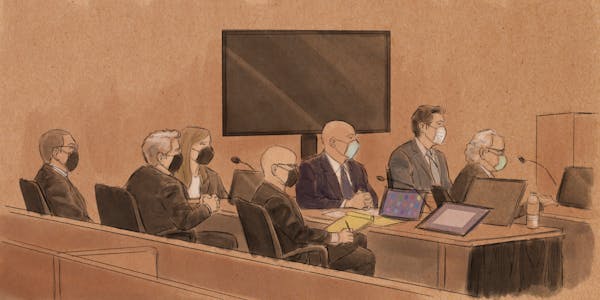A defense attorney for a former Minneapolis police officer questioned Friday whether poor training and a paramilitary culture were to blame for his client's failure to stop Derek Chauvin from killing George Floyd.
In cross-examining a police inspector, Thomas Plunkett expounded on his opening statement that the department failed to adequately train J. Alexander Kueng, a rookie, especially on the "duty to intervene," a policy Plunkett has said amounts to "little more than a word on a PowerPoint" presentation.
Chauvin was Kueng's training officer for two out of four phases of the training process. Under Plunkett's questioning, Inspector Katie Blackwell acknowledged recruits are told to follow the lead of their field training officers, who have great influence on their careers.
At one point during his cross-examination, Plunkett asked Blackwell if the department taught recruits an "us vs. them" mentality.
The attorney then played a video clip embedded in a police training PowerPoint, which contained audio of Al Pacino from the movie "Any Given Sunday." Playing a coach, Pacino gave a warrior-like speech about the need to work together to win a football game.
"You gotta look at the guy next to you," Pacino growls in the clip apparently played for police officers in training. "Look into his eyes. … You are going to see a guy who will sacrifice himself for this team because he knows when it comes down to it, you are gonna do the same thing for him."
Police training is central to the case for both the prosecution and the defense. Kueng, Thomas Lane and Tou Thao are charged with failing to provide aid to Floyd when they saw Chauvin kneeling on his neck for more than nine minutes. Kueng and Thao are also charged with failing to intervene on Floyd's behalf.
In the first week of the trial, Blackwell, the former training commander for the department, was on the stand the longest. Her testimony Thursday and Friday laid out the extensive training and refresher courses required of the Minneapolis police officers throughout their careers.
She said the three officers on trial, and Chauvin — who has already pleaded guilty in this case — failed to follow use of force policy on May 25, 2020, when they detained Floyd on his stomach with his hands cuffed behind his back.
Blackwell walked jurors through parts of the department's training manual before telling them that the actions of Lane, Kueng and Chauvin were all "inconsistent" with the department's use of force policy — particularly when Chauvin planted his knee in Floyd's neck.
She testified that when Floyd stopped resisting, the officers should have rolled him to his side in the recovery position so he could breathe. Additionally, she said Chauvin's use of "pain compliance" by twisting Floyd's hand was not necessary.
Although Chauvin was the senior officer with 19 years of experience, Blackwell said Lane and Kueng would have been in control of the scene because they arrived first. Plunkett got Blackwell to confirm that three times Lane suggested rolling Floyd to his side and Chauvin ignored him.
Plunkett asked Blackwell whether Minneapolis police recruits are expected to give "instant and unquestioned obedience" to training officers. Blackwell said yes, acknowledging Chauvin had been Kueng's trainer until just a few shifts prior to Floyd's arrest.
"People get terminated from the department because their [training officer] is not satisfied with them, correct?" Plunkett asked.
When Blackwell replied that was not solely the case, Plunkett asked if it would surprise her to learn recruits see their training officers as "terminators."
"That would surprise me," Blackwell said.
Blackwell will resume her testimony Monday under questioning by defense attorneys for Lane and Thao.

Why you should donate clothing: It (probably) won't end up at the dump

Six local newspapers serving the southwest metro will print last issue this week
Scoggins: 'Wait one more year' can't be the Wild's plan. Thankfully, it isn't.
Conservatives in Otter Tail County have been fighting each other for years. There's no end in sight.

